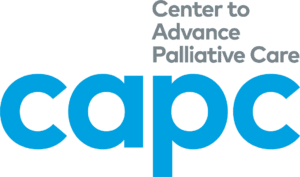 The Center to Advance Palliative Care (CAPC) is the national industry leader in advocacy for increased quantity and improved quality of palliative care programs. With over 1,800 member organizations representing 80,000 clinicians, CAPC equips healthcare leaders with messaging and strategies needed to bring about change at their own institutions. CAPC also provides best practices, toolkits and training for clinicians in various fields, with a library of over 500 online resources and one million course completions to date.
The Center to Advance Palliative Care (CAPC) is the national industry leader in advocacy for increased quantity and improved quality of palliative care programs. With over 1,800 member organizations representing 80,000 clinicians, CAPC equips healthcare leaders with messaging and strategies needed to bring about change at their own institutions. CAPC also provides best practices, toolkits and training for clinicians in various fields, with a library of over 500 online resources and one million course completions to date.
AVDF awarded a $500,156 grant to CAPC, supporting three distinct organizational initiatives throughout 2022 and 2023. The projects further CAPC’s overall mission of improving the quality of life for Black patients, pediatric patients and patients receiving care without the benefit of palliative care specialty teams.
Equitable Access for Black Patients
Working closely with an accomplished Equity Advisory Committee, CAPC completed a literature review on the state of palliative care with respect to Black patients and their families, to better understand how to redesign care delivery to mitigate disparities and reduce unnecessary suffering. CAPC also fielded a national survey to 100,000 health care professionals to ascertain existing interventions and levels of success, held in-depth interviews with a subset who led highly successful interventions, and catalogued 160 previously used models.
Synthesizing their findings, CAPC created a toolkit and published a curated selection of novel interventions on their Innovation Hub. The selected innovations have been read more than 4,000 times combined; and even though relatively new, nearly 18% of CAPC’s active health professional users have already accessed the equity resources. Resources were also disseminated broadly to CAPC’s network including with a national public briefing in 2022. Over 1,300 professionals registered for the briefing, the highest number of registrants for a CAPC virtual event in the past three years. Results of the health equity analysis were published on sites such as Hospice News, the Better Care Playbook and Health Affairs Forefront, a heavily cited, daily publication produced by the leading journal on health policy research. The CAPC team has also presented results widely to several hospice and medical convenings.
Pediatric Palliative Care
CAPC created a Pediatric Billing and Business Planning toolkit, to improve sustainability for pediatric palliative care programs, and enable growth in access to services for children with serious illness and their families. The toolkit was launched in September 2022 with a national marketing campaign and public webinar, reaching a combined estimated total of 170,000 views through email and social media. It was also featured by the National Pediatric Palliative Care Task Force. The toolkit was accessed nearly 1,000 times in its first nine months, with individual resources reaching hundreds of views each. Examples include: The Basics of Business Planning for Pediatric Palliative Care, and The Financial Case: Demonstrating Value in a Pediatric Palliative Care Program, which helps match the institution’s financial goals with the various value propositions for pediatric palliative care.
Clinical Education
CAPC created “gamification” training programs for clinicians, along with additional educational resources that simulate patient interviews and provide conversation prompts. One “game,” launched in December 2022, helps clinicians understand contributors to delirium during a hospitalization, using an engaging “Whodunnit” format. CAPC also developed a first-of-its-kind learning activity – viewed over 2,000 times in its first few months – to improve palliative care assessments with patients from different social and cultural backgrounds, through teaching communication techniques and providing in-depth case studies that reflect real-world complexities. Lastly, CAPC created conversational resources to reinforce skills taught in existing courses; examples include a script to support clinicians who must “cold call” patients and begin advance care planning conversations, and a list of phrases to respond appropriately to various emotions patients and families may express during serious illness conversations. The conversational resources reached over 10,000 collective views in the first eight months, and helped to increase the numbers of clinicians, from 26% to 59%, reporting they “strongly agree” with being comfortable in difficult conversations.
